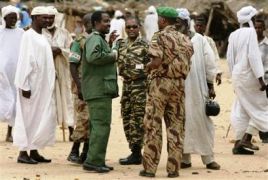Sudan’s Darfur militia attacks villages force 7,000 to flee
By Opheera McDoom
KHARTOUM, Dec 8 (Reuters) – Tribesmen attacked villages in Sudan’s Darfur region last week, forced 7,000 people from their homes and looted in the area, the U.N. said on Wednesday.

|
|
African Union ceasefire monitor Maj. Panduleni Martin, center, talks with Commander Abdul Waheed Saeed, center-left, who is in charge of a military unit calling themselves variously the Border Intelligence Division, Second Reconnaisance Brigade, or the Quick and the Horrible, also believed to form part of the Janjaweed militia, at the weekly animal market in Mistiria in North Darfur, Sudan, Tuesday, Oct 5, 2004.(AP) |
A U.N. report said 15 bodies had been found in the area around the town of Edwa in Darfur, where the United States said on Tuesday international efforts had failed to stop violence which has displaced more than 1.6 million.
The U.N. report did not say who had launched the attack. But aid community sources had said mounted Arab militias, known as the Janjaweed, had on Dec. 1 carried out an attack for the first time in months around Edwa.
“Most of the approximately 7,000 population from the area appear to have fled to Jeruf, a … (rebel-)held location…and Duma,” the U.N. report issued in Khartoum said.
Both are villages near Edwa, which lies on a major trade route between north and south Darfur. “The town and surrounding area had been subject to attack by armed tribesmen,” the U.N. report added.
The African Union (AU) has said its forces, which are monitoring a ceasefire between government and rebel forces in Darfur, came under fire while on their way to verify fighting near Edwa.
The government says its police forces also entered Edwa on Dec. 1 because the town had been used as a rebel base to loot commercial and aid vehicles. Khartoum said this week security forces had found dozens of stolen vehicles there.
Darfur rebels took up arms against Khartoum nearly two years ago in protest at what they said was the region’s marginalisation of the arid region.
The rebels accuse Khartoum of backing the Janjaweed to put down the rebellion and conduct a campaign of ethnic cleansing against Darfur’s non-Arabs. Washington has called the violence genocide. Khartoum denies links with the Janjaweed.
PLAGUED BY BANDITRY
John Danforth, U.S. ambassador at the United Nations, on Tuesday called on the African Union to send more forces to Darfur to halt atrocities.
“We are getting nowhere with respect to Darfur,” he said after the Security Council reviewed a report by U.N. Secretary General Kofi Annan saying Darfur was in chaos, plagued by banditry, rape and village burnings.
“The rebels and the government and the militia, all sides are complicit in the disaster. They sign agreements which apparently mean nothing at all,” Danforth said.
The African Union has pledged 3,300 monitors and troops to Darfur but has only about 900 on the ground.
“Let’s get as many African Union people as we can in there, and let’s at least get the full 3,300 that have been committed,” he said.
Annan’s report to the Security Council said 2.3 million people were in desperate need of aid in Darfur, where the World Health Organisation estimates more than 70,000 people have died since March from malnutrition and disease.
A joint U.N.-Sudanese food security report said erratic rainfall and conflict had created an 80 percent shortfall in food supply in Darfur during 2004. It predicted a similar pattern for 2005, the U.N. report also said.
A top U.N. aid official called Sudan’s decision to expel the country head of British charity Oxfam “very bad” and said he hoped it would be reversed, as had happened in the past.
Expelling aid officials was not “the way to treat those of us who come there to help”, United Nations Emergency Relief Coordinator Jan Egeland said in Geneva.
Sudan on Tuesday accused Oxfam director Shaun Skelton of violating visa regulations by working in Khartoum when his permit was for Darfur, and ordered him to leave as soon as possible.
(Additional reporting by Richard Waddington in Geneva)
